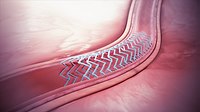
Photo from wikipedia
Background Percutaneous coronary intervention (PCI) in the acute coronary syndrome (ACS) setting is associated with a greater probability of device failure. The currently ongoing development of new scaffold technologies has… Click to show full abstract
Background Percutaneous coronary intervention (PCI) in the acute coronary syndrome (ACS) setting is associated with a greater probability of device failure. The currently ongoing development of new scaffold technologies has concentrated an effort on improving the PCI outcomes, including the use of new biodegradable materials. This pilot study evaluates the performance of a magnesium bioresorbable scaffold (Magmaris, Biotronik, Germany) in comparison to the sirolimus‐eluting bioresorbable polymer stents (BP-SES) (Ultimaster, Terumo, Japan) in the NSTE-ACS setting. Methods The population of this pilot comprised 362 patients assigned to one of two arms (193-Magmaris vs 169-Ultimaster). The data regarding the primary outcome comprised of death from cardiac causes, myocardial infarction, and stent thrombosis, along with target-lesion failure (TLF) and other clinical events was collected in the 1-yearfollow-up. Results There were no statistically significant differences in clinical outcomes in the short term (30 days) or in the 1-yearfollow-up between both groups. Conclusion At 12 months, there were no statistically significant differences between the Magmaris and Ultimaster for composed endpoints or the TLF.
Journal Title: Journal of Interventional Cardiology
Year Published: 2022
Link to full text (if available)
Share on Social Media: Sign Up to like & get
recommendations!